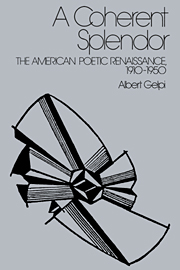Book contents
- Frontmatter
- Contents
- Acknowledgments
- Dedication
- Introduction. The Janus-Face of Romanticism and Modernism
- 1 Robert Frost and John Crowe Ransom: Diptych of Ironists, the Woodsman and the Chevalier
- 2 Wallace Stevens: World as Mundo, Mundo as World
- 3 T. S. Eliot: The Lady Between the Yew Trees
- 4 Ezra Pound: Between Kung and Elcusis
- 5 H. D.: Helen in Bethlehem, Hilda in Egypt
- 6 William Carlos Williams: Mother-Son and Paterson
- 7 Allen Tate and Hart Crane: Diptych with Angels and Demons
- Coda. Yvor Winters and Robinson Jeffers: The Janus-Face of Anti-Modernism
- Notes
- Index
4 - Ezra Pound: Between Kung and Elcusis
Published online by Cambridge University Press: 22 January 2010
- Frontmatter
- Contents
- Acknowledgments
- Dedication
- Introduction. The Janus-Face of Romanticism and Modernism
- 1 Robert Frost and John Crowe Ransom: Diptych of Ironists, the Woodsman and the Chevalier
- 2 Wallace Stevens: World as Mundo, Mundo as World
- 3 T. S. Eliot: The Lady Between the Yew Trees
- 4 Ezra Pound: Between Kung and Elcusis
- 5 H. D.: Helen in Bethlehem, Hilda in Egypt
- 6 William Carlos Williams: Mother-Son and Paterson
- 7 Allen Tate and Hart Crane: Diptych with Angels and Demons
- Coda. Yvor Winters and Robinson Jeffers: The Janus-Face of Anti-Modernism
- Notes
- Index
Summary
Just after the advent of the new century, Ezra Pound, an only child born in 1885 in the pioneer mining town of Hailey, Idaho, and reared by adoring parents in suburban Philadelphia, was pondering his calling as a poet. Moreover, like Homer (we can presume), like Vergil (quite clearly), like Dante and Spenser and Milton (we know), he was thinking how to be a great poet. By about 1904, not yet twenty and still an undergraduate at Hamilton College, he had conceived the ambition of writing an epic, as his worthy predecessors had. Furthermore, since he recognized the national character of the epic poets, he had to ask himself how to be the great American poet. Finally, steeped in, but (he hoped) emerging from, the cloyed atmosphere of fin de siècle Romanticism, he determined to make himself the great modern American poet.
From what he knew about American poetry before him, Pound could take only Walt Whitman seriously enough to grumble about: it was against Whitman that he had to define himself. Whitman had been naive in his optimistic celebration of American urban and technological culture, he had been shaggy and rough-hewn in his expression; but for the youthful Pound, brash but unproved, he was the magnetic but intimidating literary father. It is a decisive fact for twentieth-century American poetry that Pound chose not to reject Whitman's bardic energy but to sophisticate it for his own purposes.
- Type
- Chapter
- Information
- A Coherent SplendorThe American Poetic Renaissance, 1910–1950, pp. 169 - 252Publisher: Cambridge University PressPrint publication year: 1988



